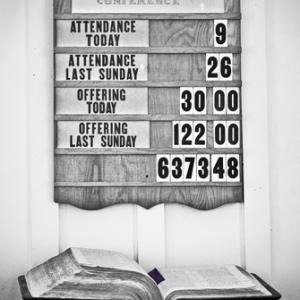Tom Ehrich is a writer, church consultant and Episcopal priest based in New York. He is the author of Just Wondering, Jesus and founder of the Church Wellness Project. His website is www.morningwalkmedia.com. Follow Tom on Twitter @tomehrich. Tom's posts appear via RNS.
Posts By This Author
'Gothic Piles' No Longer Necessary for Finding Faith
On a Greenwich Village street where male prostitutes seeking customers shout out their dimensions, I walked past an open but empty church on my way to the subway.
In times past, flocking to church on Sunday morning was a beloved family routine, even here in bad old Gotham. Now they’re trying nontraditional worship on Sunday evenings.
It’s a struggle, both here and elsewhere in the 21st-century Christian world. Buildings with “beautiful stones and gifts dedicated to God,” as Luke described the temple in ancient Jerusalem, are falling into disuse and disrepair — not because Caesar attacked and took revenge on an alien religion, but because the world changed and gathering weekly in “Gothic piles” no longer seems necessary for finding faith.
On Accountability: The Buck Never Stops
It was a strange, but telling, spectacle when those who billed the government millions for working on its Affordable Health Care registration system denied any accountability for the portal’s astounding failure.
“The other guy did it,” as they say in court. The client kept changing specs, no one did any whole-system testing, other vendors are to blame — blah, blah, blah.
Whatever shred of truth lay in their blame-shifting ran up against another wall of non-accountability. The Republicans did it with their insane sequestration, said Democrats. The Democrats did it, said the GOP. Health and Human Services did it. The Oval Office did it.
In the end, of course, no one will accept accountability, for we live in an age when the “buck” never stops on one’s own desk, if it stops at all.
Democracy is a Marketplace of (Sometimes Obnoxious) Ideas
Time was when a determined minority vowed to change the nation’s collective mind about racial integration and the Vietnam War.
I was in that minority. We considered our cause just. We called our tactics “civil disobedience,” “grass-roots organizing,” “protest,” “civil rights,” “saving America.”
It’s a bit disingenuous now for us to lambaste a conservative minority for wanting the same leverage and for using the same tactics. “Civil disobedience” can’t be relabeled “obstructionism” just because the other side is using it.
Challenge and Disruption
I had the privilege of teaching a pastoral theology class at Seminary of the Southwest in Austin, Texas, last week.
I had the entire senior class: 13 young, promising, enthusiastic, veterans of church wars, and yet eager to get started.
Like any speaker with a full deck of PowerPoint slides, I probably said more than was needed. But I wanted to make, reinforce, clarify, and leave no mistake about my main point: Business as usual is off the table.
After nearly 50 years of relentless decline in mainline churches, business as usual is a sinking ship. The way forward lies in fresh ideas, turnaround strategies, entrepreneurial enthusiasm for risk, and learning from failure.
Old Habits Die Hard
I got fitted for a custom-tailored suit this week.
Not because I suddenly found a pot of money. I didn’t, and I didn’t need to. The cost for this Hong Kong tailor is comparable to what I have been paying for off-the-rack suits.
My problem is middle age. My shifting body type makes off-the-rack suits too wide in the shoulders and too long. It’s proof that life keeps on changing, and that the way forward must include getting unstuck from old ideas.
Who Elected These Clowns?
In a world far removed from the tragic cesspool of Washington scheming and maneuvering, real people flocked to Central Park on El Camino Real for this town’s first Bacon & Brew Festival.
It was wildly successful. Vendors ran out of food and beverages; sponsors closed off ticket sales early. The parched and mean-spirited landscape that ideologues are trying to manufacture seemed distant.
As they stood in line for burgers, barbecue, fries smothered in cheese, and microbrewed beers, young adults eyed each other’s pregnant bulges and baby strollers. I heard no muttering about Obamacare. People have better things to do than to defund a program that benefits fellow citizens.
Stepping in When Politicians Step Aside
A straggle of kids came up for children’s time at Poland Presbyterian Church, a 211-year-old congregation established on Lot One, in Township One, in Range One of what was once known as the Connecticut Western Reserve.
The church’s education minister asked them to do this year’s CROP Walk in nearby Youngstown. Two miles, five miles, whatever they can do to raise money for alleviating hunger.
“Seventeen million children will go to bed hungry in America tonight,” she explained.
The Shameful Politics of Scorn
I got a glimpse into the politics of scorn this week.
The visual was a photo accompanying a New York Times article on rental properties in Memphis, Tenn. The article itself seemed innocuous, about how foreclosed homes are being scooped up by outside investors and turned into rentals.
The photo, however, was troubling. It showed a young man lazing in a large chair while his two children stared numbly at a television screen and his wife tapped away on a cell phone.
I have no clue into this family’s character. But the visual screamed: “Idle! Lazy!”
The Revolving Door of Church 'CEOs'
Microsoft CEO Steve Ballmer’s surprise decision to retire does more than throw the technology industry into a frenzy of speculation. It raises the problem of succession.
From major corporations to startups led by visionary leaders, from universities to churches, the departure of the top leader can stop momentum and usher in months, perhaps years, of uncertainty.
Even though dealing with succession is a primary task for a board of directors — some say it’s their preeminent task — relatively few boards take the assignment seriously. They focus instead on the easier work of jousting with the top leader and shilling for institutional investors.
What should be an orderly process of preparing for leadership transition instead becomes a lurching from one standalone regime to the next.
Many board members want the rush of being co-managers of the institution. This is especially true in churches, where boards enjoy making day-to-day decisions about operations. Since a strong central leader would get in their way, many church councils discourage strong clergy and reward compliant permission seekers.
The American Church: Searching for a New Imprint
Out of nowhere, I felt an urge to listen to Willie Nelson’s epic album Stardust, a collection of pop standards that went platinum when it was released in 1978.
As I listened to “Blue Skies” and “On the Sunny Side of the Street,” I remembered buying this album for my father. I thought he would enjoy a fresh take on these songs of his youth, his travails during the Great Depression, and the war that defined his generation.
I don’t think he ever listened to it a second time. He loved the songs, but he couldn’t bear the fresh take. He wanted Gertrude Lawrence, the original voices of Tin Pan Alley and Depression-era hopefulness, the crooners that carried his generation to war and back home again.
I understand. The music we hear at our first dreaming, first love, first dance becomes the soundtrack of our lives.
For many people, the same is true of faith. Our images of God, songs of worship and language of prayer tend to be those we acquired at first awareness. Many more images, songs and words will come later, but none might resonate so deeply as those that were imprinted on us early on.
What's So Great About Perfection?
Two Sunday meetings prevented my going to the country with the family.
So on Saturday, I took a long walk up the Hudson River and then sat beside an open window overlooking the apartment house courtyard and felt a cool breeze.
No, it wasn’t the same as a screened porch upstate. But it worked. Why? Because I made it work. I was motivated to step away from my desk and do something different.
Could I have had a more perfect day? Sure, I suppose so. But I didn’t need perfection. I just needed something different. Yes, I was “settling,” as they term it. But that’s part of maturity: knowing that progress matters more than perfection. Sometimes you don’t get exactly what you want, and making do can be enough. Tweaking the day can make it a better day.
Yet many people continue to chase perfection and refuse to compromise with realities that fall short.
Moving Backward on Racial Progress
Adaptation is how a bitter and broken South survived its own worst instincts after the war. Progressive pockets emerged in college towns and later in large cities. Hungry for Northern business, the region became less racially polarized. In time, a black man could become mayor of Atlanta and another could become the Episcopal bishop of North Carolina.
The Rev. Martin Luther King, Jr.’s dream of 50 years ago came to seem possible. Distant, yet possible.
But now the dream has receded. The fact of a black president seems to have reopened a pulsing vein of racism. Operating under cover of fiscal austerity, vengeful state politicians are gutting decades of programs that helped the South move forward by helping blacks and Latinos to have a chance.
No more affirmative action, they say; no more dark-skinned citizens flocking to voting stations; no more voting districts shaped by fairness; no more protections from ground-level aggression against people of color.
Once again, as happened in the 19th century, impoverished whites who should be lining up to resist predatory behavior by the moneyed class are being turned against their own best interests by race politics.
Moving From the Sanctuary to Social Networks
A tech writer’s obituary for PCWorld’s print magazine — part tongue-in-cheek, part nostalgia riff — reminded me that I once devoured that magazine, now kaput.
It was an early lens into the fascinating world of personal computing. Its ads and articles stoked dreams of power and speed.
I soon became part of PCWorld’s dilemma. I dropped the print mag and began seeking tech news on the Internet. It was faster and fresher, had clickable links to other sites, great art, and brevity. PCWorld itself went online.
Much of my world has switched to the Internet. I do most of my banking and bill paying online, shop online, order lunch online, learn choir music online, teach classes online, use email and text messaging extensively, and read the news online.
Nothing unusual in any of that. Such web-centered behavior has become the new normal. Any enterprise that isn’t considering ways to move its operations online is losing its future.
In my world, more and more churches are going web. Electronic newsletters replace mailed paper. Clergy use email to communicate, as do staff and volunteers. Tweets, Facebook posts, e-blasts, and text messages carry word of emergencies. Constituents make donations online.
There’s more. Classes are moving online, as are interviews with job candidates and opinion surveys. Some congregations are experimenting with worship online and small groups. Every Sunday morning, some 600,000 people a minute access Bible verses online using one app.
The Reckless Right-Wing War on America
It is tragic to watch contemptuous right-wingers declaring war on America.
With little heed for consequences on either actual people or the national interest, they declare war on the poor, the hungry, Native Americans, the unemployed, gays and lesbians, immigrants, minority voters, women, military dependents, and public education.
The recent farm bill — which gives public subsidies to agribusiness and denies food stamps to the hungry — is just the latest sortie in a determined decades-long assault on American values.
Learning to Love Complexity
Tumult in Egypt reminds me how complicated the world can be, especially for a culture like our own that is shaped by good guy vs. bad guy dramas.
Who are the “good guys” in Cairo? Is the ousted president a good guy for being democratically elected or a bad guy for pursuing isolationist Islamic policies? Is the military saving Egypt or preserving privileges?
It isn’t just the inherent complexity of any human situation. It’s the complexity of societies that have rules and histories quite unlike our own.
The Value of Connections
For our three-night sojourn in coastal Maine, far from crowds and constructive work, we stayed at a lovely bed-and-breakfast here called the Hodgdon Island Inn.
Once a sea captain’s home, it overlooks a small drawbridge to Barter’s Island. Farther along a seacoast marked by islands and coves lies the seasonally popular town of Boothbay Harbor.
I love the world of B&Bs. Each room is furnished in eclectic style, not hotel same-old. As an early riser, I like sitting by myself in a real living room with a coffee machine and wi-fi.
COMMENTARY: The Real Threat to Marriage
As I officiate at a family wedding in this charming coastal city, it seems to me the institution of marriage is alive and well — and in serious trouble.
The trouble isn’t out-in-the-open homosexuality, birth control, abortion, assertive women, or any of the right-wing alarms.
The trouble is poverty. The less affluent you are, the more likely you are to have a child without the benefit of a partner, at an age too young for effective parenting, and in chaotic living arrangements.
When the Government Lies, a Covenant is Broken
After denials and evasions, we learned that two successive administrations lied to the American public about unprecedented spying on ordinary citizens.
The latest phase of this longtime spying effort began shortly after 9/11 and accelerated steadily, as the government used existing laws and newly passed laws to demand access to supposedly private information, such as cell phone call logs and email data.
It might have begun as an effort to track foreign terrorists as they interacted with allies in the U.S. and visited the U.S. But it spun out of control as the National Security Agency decided it needed to spy on all citizens.
Mindless Metrics
The go-to number in American religion is “ASA” — average Sunday attendance. Or as an irreverent colleague put it, “Fannies in the pews.”
It’s a meaningless metric, but it’s easy. Open the doors on Sunday, wait for the stragglers, then dispatch ushers to count the house.
Entire methodologies for church development have been built around this number, as if fanny count dictated how a church should behave. Problem is, ASA isn’t a useful measure of quantity, and it says nothing about quality.
A much better quantitative measure would get at “touches,” that is, how many lives are being touched by contact with the faith community in its various Sunday, weekday, off-site and online ministries — and then, for a qualitative measure, asking how those lives are being transformed.
Those are difficult metrics to track, of course, and that’s why many congregations stick to ASA and shun the harder work of measuring outcomes and impact.
The Thrill of the Race
On the day after the Indianapolis 500-mile race, I wonder why the self-proclaimed “Greatest Spectacle in Racing” matters so much to me.
It isn’t a nostalgia trip to my growing-up days in Indianapolis. Indiana high school basketball mattered far more to me at the time, but I can barely raise a flicker of interest in it now.
It isn’t deep association with the sport. I recognize only a few of the drivers’ names and know less and less about the technology on display — 33 open-wheeled race cars driving 500 miles at speeds exceeding 220 mph. I care nothing at all about attempts to turn one race into a national franchise.
Nor am I tracing a link to my hometown roots. For me, Indianapolis is about family, not racing.
No, I think it’s the race itself. The 500 is pure experience, unapologetic, radically open to anyone who can try, and yet limited to a small circle of men and women who can do it well.



















